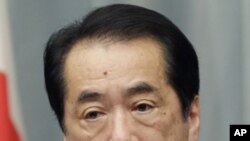Japanese Prime Minister Naoto Kan has renewed his pledge for a full review of his energy policy, including plans that call for nuclear power to provide 50 percent of the country's energy needs by 2030.
Nuclear power currently supplies 30 percent of Japan's energy needs.
Kan also said he will cut his monthly salary and bonuses paid him as Japan's leader until the crisis at the damaged Fukushima-Daiichi nuclear power plant is over.
Kan announced the $20,000 monthly pay cut Tuesday in Tokyo, saying the government - as a proponent of nuclear power - bears "a great responsibility" for the nuclear accident. He said he will continue to receive his lawmaker's salary.
Hours earlier, authorities allowed nearly 100 residents to return to their homes near the crippled plant in the country's northeast to collect bankbooks, medicines and other personal belongings.
It was the first time anyone has been officially permitted back into the 20-kilometer evacuation zone since a March 11 earthquake and tsunami destroyed cooling systems at the plant, causing radiation leaks. A few residents sneaked back before the government imposed legal restraints in late April.
The residents who returned Tuesday were provided with protective clothing, radiation-measuring dosimeters and two-way radios, and were screened for radiation exposure after the two-hour visits. Additional visits are planned for residents of nine communities inside the zone before the end of May.
Radiation leaking from the plant has made the surrounding area uninhabitable and has contaminated farm crops and fish stocks in much wider areas of northeastern Japan.
The plant's operator, Tokyo Electric Power Company, approached the government Tuesday for assistance in making what are expected to be massive compensation payments to those who suffered losses because of the nuclear accident.
Company officials say they are prepared to take additional restructuring steps, including salary cuts and asset sales. The company has already cut salaries by 50 percent for board members, 25 percent for managers and 20 percent for ordinary staff.
Some information for this report was provided by AP, AFP and Reuters.




